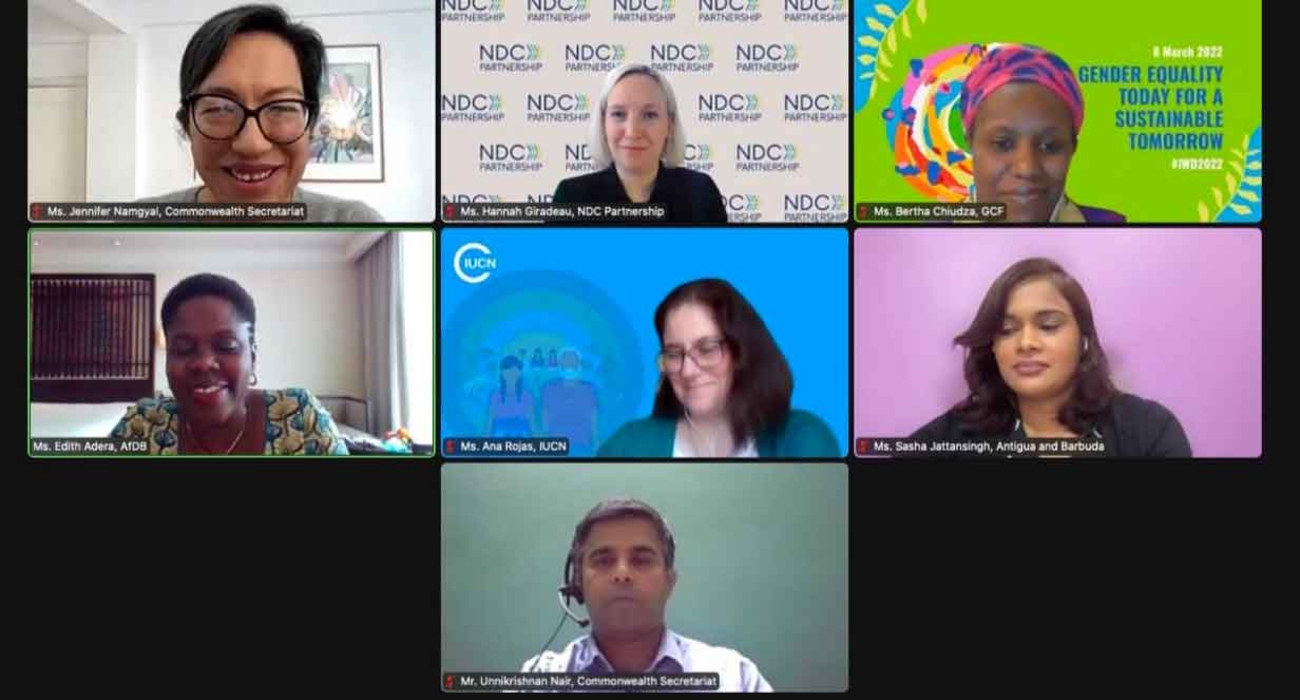
Experts share lessons learned on gender-responsive climate action during Commonwealth NDC webinar
24 March, 2022This year, Edith Ofwona Adera, Coordinator of the Africa Adaptation Acceleration Program (AAAP) and the African Development Bank’s Regional Principal Officer for Climate Change and Green Growth, marked International Women’s Day in a special way.
Adera took part in a panel discussion organised by the Commonwealth Secretariat, reflecting this year’s theme: Gender equality today for a sustainable tomorrow.
The panel, hosted by Jennifer Namgyal of the Commonwealth Secretariat, brought together experts who shared their experiences and lessons learned on integrating gender equality in Nationally Determined Contributions, or NDCs, across their respective regions and institutions. NDCs are national plans highlighting climate actions, including targets, policies and measures that governments aim to implement.
Hannah Girardeau, of the NDC Partnership Support Unit, kicked off the session with a presentation on the findings of an analysis of gender considerations in revised NDCs of the partnership’s member countries. The assessment revealed that more countries had now included the fundamental building blocks of gender-responsive climate action in their policies and plans. Girardeau noted that there is a need to invest in other critical elements such as conducting gender analyses, developing indicators, and establishing gender-responsive budgets to complement progress achieved.
Adera agreed with her. “As climate change impacts affect people differently, the responses need to be differentiated, based on identified unique needs, informed by disaggregated data,” Adera added.
To address this challenge, the African Development Bank is supporting national statistical systems in five countries through a Capacity Building for Gender Statistics and Monitoring Systems project. The project aims to produce quality, comparable and regular gender statistics to address national data gaps, strengthen monitoring systems, and integrate gender indicators across sectors.
Bertha Chiudza of the Green Climate Fund said a key requirement for all its financed activities is to ensure gender considerations are included in the development of action plans and assessments. “For its support on Nationally Determined Contributions, the Green Climate Fund ensures that gender considerations are brought in from planning and design, implementation and reporting across the sectors prioritized by countries, while ensuring inclusive stakeholder consultations,” Chiudza stated.
Sasha Jattansingh, the Commonwealth Climate Finance Adviser, gave insights into Antigua and Barbuda’s actions to mainstream gender equality into Nationally Determined Contributions. The country recognized equity issues and committed to a just energy transition with a strong focus on gender, Jattansingh noted. Antigua and Barbuda is an example of a country that has made progress in developing an inclusive renewable energy strategy that promotes socially inclusive, gender-responsive, and accessible investment opportunities.
Anna Rojas of the International Union for Conservation of Nature also shared her experiences and lessons in integrating gender into Nationally Determined Contributions, pointing out that biodiversity issues are now being integrated more consistently in these plans. She called for local-level conversations with women to tap into their strengths and rich knowledge. “Engagement with women will avoid dismal adaptation because, the more we identify needs, strengths, and solutions, the better we will be prepared,” she emphasized.
The African Development Bank is rolling out a detailed analysis of climate-gender hotspots in Rwanda. Adera said it would highlight real gender gaps and deep vulnerabilities, and how best climate interventions can address these gender issues.
Finance also emerged as one of the vital tools to promote gender equality in Nationally Determined Contributions. Innovative financial instruments and solutions must come into play when addressing gender inequalities for climate change interventions, noted Unnikrishnan Nair of the Commonwealth Secretariat.